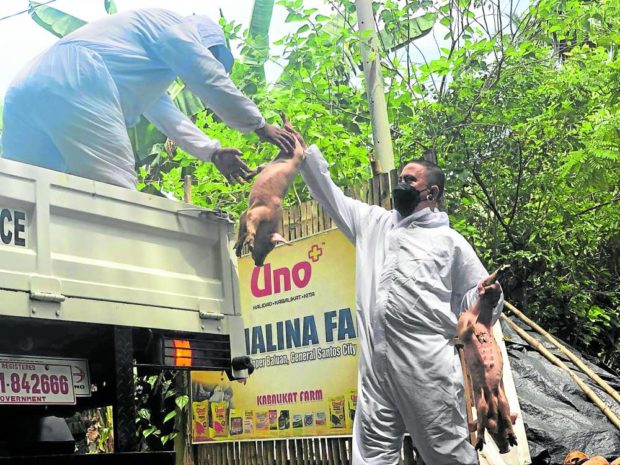ASF hits GenSan village, threatens P 8-billion hog industry

PREVENTIVE MEASURE | Personnel of the General Santos City veterinary office haul pigs from backyard farms in Barangay Baluan for culling after an outbreak of African swine fever in the area. Authorities are acting fast to prevent the disease from spreading to large commercial hog farms. (Photo by RICHELYN GUBALANI / Contributor)
GENERAL SANTOS CITY, South Cotabato, Philippines — The city government has ordered the immediate culling of backyard hogs in a village here amid another confirmed incursion of the African swine fever (ASF), the second since January this year.
Dr. Emilio Gargaran, acting head of the City Veterinary Office (CVO), said Wednesday the preemptive culling covers backyard farms at Purok Masagana, Upper Baluan in Barangay Baluan and adjacent communities.
Veterinary personnel already culled since Monday a total of 119 hogs, affecting over 40 backyard raisers in the area.
Gargaran said the Department of Agriculture’s Regional Animal Disease Diagnostic Laboratory in Barangay Lagao here confirmed on Monday new cases of ASF through blood samples of three backyard hogs from Purok Masagana.
“We immediately conducted preemptive culling and intensified the disease surveillance after the results came out,” he told reporters.
Article continues after this advertisementA total of 77 hogs from 35 backyard raisers in the area and within the 500-meter radius of the identified epicenter were culled on Monday, Gargaran said.
Article continues after this advertisementThe culled hogs increased to 108 on Tuesday and 11 more were added Wednesday morning based on partial reports from the CVO.
The affected raisers were given P5,000 as compensation for the culled hogs through support from the South Cotabato Swine Producers Association (Socospa).
The investigation is ongoing as to the possible source of the latest ASF infections, which could threaten the city’s P8-billion hog industry, Gargaran said.
Containing disease spread
He said they earlier received reports of suspected ASF deaths among stocks of hog dealers in the area.
The first outbreak in late January was also traced by CVO to hog stocks purchased by a local dealer from ASF-affected areas in Davao del Sur province.
Back then, at least 508 hogs were culled from backyard farms in Purok San Lorenzo, Barangay Apopong, and nearby areas, before it was declared contained.
Gargaran assured that the local government was taking all necessary measures to prevent the ASF contamination from spreading to other areas in the city.
Last month, the Bureau of Animal Industry placed the towns of Banga and Surallah in nearby South Cotabato province under the red, or infected zone, due to ASF outbreaks.
This city and South Cotabato are among the top producers of live hogs and pork in the country, shipping out at least 15,000 animals every two weeks to Metro Manila and other areas in Luzon.
Socospa, the biggest association of commercial swine farms in the area with at least 20 members, has a combined sow population of 55,000 and produces at least 45,000 hogs a month.
RELATED STORIES
GenSan moving to protect P8-B hog industry vs ASF outbreak
Gensan readies ASF shields for P2.5B hog industry